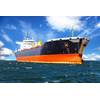Implementing Polar Code
International Maritime Organization (IMO) was on hand to offer advice and guidance at the third edition of the Arctic Council's Arctic Shipping Best Practice Information Forum, held in London, United Kingdom (3-4 June).
The Forum supports the effective implementation of IMO's Polar Code. This year's theme was "'From Theory to Practice" and provided an opportunity for sharing of best practices and experiences.
The Forum was attended by representatives from a range of stakeholders with an interest in safe and environmentally sound Arctic shipping, including shipowners and operators, regulators, classification societies, marine insurers, and indigenous and local communities.
In a video message to open the meeting, IMO Secretary-General Kitack Lim said, " IMO is fully aware of the benefits of a collaborative approach and its objectives can only be met if all stakeholders are involved and take on their responsibilities."
IMO recently became an Arctic Council Observer, which will further strengthen the two organizations' efforts in support of sustainable Arctic shipping.
The Arctic Shipping Best Practice Information Forum was established in 2017 by the eight Arctic States (Canada, the Kingdom of Denmark, Finland, Iceland, Norway, the Russian Federation, Sweden and the United States) to help raise awareness and to promote the effective implementation of the Polar Code.
The Forum's web portal provides links to information essential to implementation of and compliance with the Polar Code, including hydrographic, meteorological, and ice data information needed to plan for safe and environmentally sound navigation in the Arctic.
The forum event was hosted by the United States, at its Embassy in London.
Related News





